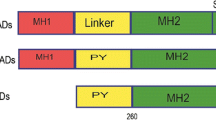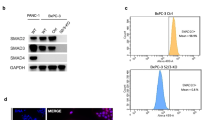Abstract
SMAD4 is a downstream mediator of transforming growth factor beta. While its tumor suppressor function has been investigated as a prognostic biomarker in several human malignancies, its role as a prognostic marker in breast carcinoma is still undefined. We investigated SMAD4 expression in breast carcinoma samples of different histologic grades to evaluate the association between SMAD4 and outcome in breast cancer. We also investigated the role of SMAD4 expression status in MDA-MB-468 breast cancer cells in responding to TGF-β stimulation. SMAD4 expression was assessed in 53 breast ductal carcinoma samples and in the surrounding normal tissue from 50 of the samples using immunohistochemistry, Western blot, and real-time PCR. TGF-β-SMAD and non-SMAD signaling was assessed by Western blot in MDA-MB-468 cells with and without SMAD4 restoration. SMAD4 expression was reduced in ductal breast carcinoma as compared to surrounding uninvolved ductal breast epithelia (p < 0.05). SMAD4 expression levels decreased from Grade 1 to Grade 3 ductal breast carcinoma as assessed by immunohistochemistry (p < 0.05). Results were recapitulated by tissue array. In addition, immunohistochemistry results were further confirmed at the protein and mRNA level. We then found that non-SMAD MEK/MAPK signaling was significantly different between SMAD4 expressing MDA-MB-468 cells and SMAD4-null MDA-MB-468 cells. This is the first study indicating that SMAD4 plays a key role in shifting MAPK signaling. Further, we have demonstrated that SMAD4 has a potential role in the development of breast carcinoma and SMAD4 was a potential prognostic marker of breast carcinoma. Our findings further support the role of SMAD4 in breast carcinoma development. In addition, we observed an inverse relationship between SMAD4 levels and breast carcinoma histological grade. Our finding indicated that SMAD4 expression level in breast cancer cells played a role in responding non-SMAD signaling but not the canonic SMAD signaling. Further mechanistic studies are necessary to establish the role of SMAD4 in breast carcinoma prognosis and potential specific targeting.





Similar content being viewed by others
Abbreviations
- TGF:
-
β: Transforming growth factor beta
- MAPK:
-
Mitogen-activated protein kinase
- PI3K:
-
Phosphatidylinositol 3-kinase
- ERK:
-
Extracellular signal-regulated kinase
- MMP:
-
Matrix metalloproteinase
- EMT:
-
Epithelial–mesenchymal transformation
- IHC:
-
Immunohistochemistry
- ERα:
-
Estrogen receptor α
- AKT:
-
Protein kinase B
- JNKs:
-
c-Jun amino-terminal kinases
Reference
Jemal A, Bray F, Center MM, Ferlay J, Ward E, Forman D. Global cancer statistics. CA Cancer J Clin. 2011;61(2):69–90.
Jemal A, Center MM, DeSantis C, Ward EM. Global patterns of cancer incidence and mortality rates and trends. Cancer Epidemiology Biomarkers & Prevention. 2010;19(8):1893–907.
Wilson CA, Cajulis EE, Green JL, Olsen TM, Chung YA, Damore MA, et al. HER-2 overexpression differentially alters transforming growth factor-beta responses in luminal versus mesenchymal human breast cancer cells. Breast Cancer Res. 2005;7(6):R1058–79.
Bombonati A, Sgroi DC. The molecular pathology of breast cancer progression. J Pathol. 2011;223(2):308–18.
Aas T, Børresen AL, Geisler S, Smith-Sørensen B, Johnsen H, Varhaug JE, et al. Specific P53 mutations are associated with de novo resistance to doxorubicin in breast cancer patients. Nat Med. 1996;2(7):811–4.
Depowski PL, Rosenthal SI, Ross JS. Loss of expression of the PTEN gene protein product is associated with poor outcome in breast cancer. Mod Pathol. 2001;14(7):672–6.
Atchley DP, Albarracin CT, Lopez A, Valero V, Amos CI, Gonzalez-Angulo AM, et al. Clinical and pathologic characteristics of patients with brca-positive and brca-negative breast cancer. J Clin Oncol. 2008;26(26):4282–8.
Arun B, Kilic G, Yen C, Foster B, Yardley DA, Gaynor R, et al. Loss of FHIT expression in breast cancer is correlated with poor prognostic markers. Cancer Epidemiology Biomarkers & Prevention. 2005;14(7):1681–5.
Zeng Q, Pasche B. TGF-β signaling alterations in neoplastic and stromal cells. Cancer Genome and Tumor Microenvironment 2010:335–48.
Bachman KE, Park BH. Duel nature of TGF-[beta] signaling: tumor suppressor vs. tumor promoter. Curr Opin Oncol. 2005;17(1):49–54.
Ding Z, Wu CJ, Chu GC, Xiao Y, Ho D, Zhang J, et al. SMAD4-dependent barrier constrains prostate cancer growth and metastatic progression. Nature. 2011;470(7333):269–73.
Massagué J. TGFβ signalling in context. Nature Reviews Molecular Cell Biology 2012.
Koumoundourou D, Kassimatis T, Zolota V, Tzorakoeleftherakis E, Ravazoula P, Vassiliou V, et al. Prognostic significance of tgfβ-1 and psmad2/3 in breast cancer patients with T1-2, N0 tumours. Anticancer Res. 2007;27(4C):2613–20.
Feldmann G, Beaty R, Hruban RH, Maitra A. Molecular genetics of pancreatic intraepithelial neoplasia. J Hepato-Biliary-Pancreat Surg. 2007;14(3):224–32.
Boulay JL, Mild G, Lowy A, Reuter J, Lagrange M, Terracciano L, et al. SMAD4 is a predictive marker for 5-fluorouracil-based chemotherapy in patients with colorectal cancer. Br J Cancer. 2002;87(6):630–4.
Taylor MA, Lee Y-H, Schiemann WP. Role of tgf-β and the tumor microenvironment during mammary tumorigenesis. Gene Expr. 2011;15(3):117–32.
Wiercinska E, Naber HPH, Pardali E, van der Pluijm G, van Dam H, ten Dijke P. The tgf-β/smad pathway induces breast cancer cell invasion through the up-regulation of matrix metalloproteinase 2 and 9 in a spheroid invasion model system. Breast Cancer Res Treat. 2011;128(3):657–66.
Li Q, Wu L, Oelschlager DK, Wan M, Stockard CR, Grizzle WE, et al. Smad4 inhibits tumor growth by inducing apoptosis in estrogen receptor-alpha-positive breast cancer cells. J Biol Chem. 2005;280(29):27022–8.
Deckers M, van Dinther M, Buijs J, Que I, Löwik C, van der Pluijm G, et al. The tumor suppressor smad4 is required for transforming growth factor beta-induced epithelial to mesenchymal transition and bone metastasis of breast cancer cells. Cancer Res. 2006;66(4):2202–9.
Ren Y, Wu L, Frost AR, Grizzle W, Cao X, Wan M. Dual effects of tgf-beta on eralpha-mediated estrogenic transcriptional activity in breast cancer. Mol Cancer. 2009;8:111.
Dumont N, Bakin AV, Arteaga CL. Autocrine transforming growth factor-beta signaling mediates smad-independent motility in human cancer cells. J Biol Chem. 2003;278(5):3275–85.
Ao M, Williams K, Bhowmick NA, Hayward SW. Transforming growth factor-beta promotes invasion in tumorigenic but not in nontumorigenic human prostatic epithelial cells. Cancer Res. 2006;66(16):8007–16.
Safina A, Vandette E, Bakin AV. ALK5 promotes tumor angiogenesis by upregulating matrix metalloproteinase-9 in tumor cells. Oncogene. 2007;26(17):2407–22.
Imamichi Y, Waidmann O, Hein R, Eleftheriou P, Giehl K, Menke A. TGF beta-induced focal complex formation in epithelial cells is mediated by activated ERK and JNK MAP kinases and is independent of smad4. Biol Chem. 2005;386(3):225–36.
Rosman DS, Phukan S, Huang C-C, Pasche B. TGFBR1*6A enhances the migration and invasion of MCF-7 breast cancer cells through rhoa activation. Cancer Res. 2008;68(5):1319–28.
de Winter JP, Roelen BA, ten Dijke P, van der Burg B, van den Eijnden-van Raaij AJ. DPC4 (SMAD4) mediates transforming growth factor-beta1 (tgf-beta1) induced growth inhibition and transcriptional response in breast tumour cells. Oncogene. 1997;14(16):1891–9.
Zhang W, Liu HT. MAPK signal pathways in the regulation of cell proliferation in mammalian cells. Cell Res. 2002;12(1):9–18.
Yang G, Yang X. Smad4-mediated tgf-beta signaling in tumorigenesis. Int J Biol Sci. 2010;6(1):1–8.
Xie W, Mertens JC, Reiss DJ, Rimm DL, Camp RL, Haffty BG, et al. Alterations of smad signaling in human breast carcinoma are associated with poor outcome: a tissue microarray study. Cancer Res. 2002;62(2):497–505.
Stuelten CH, Buck MB, Dippon J, Roberts AB, Fritz P, Knabbe C. Smad4-expression is decreased in breast cancer tissues: a retrospective study. BMC Cancer. 2006;6:25.
LeDai J, Bansal RK, Kern SE. G1 cell cycle arrest and apoptosis induction by nuclear Smad4/Dpc4: phenotypes reversed by a tumorigenic mutation. NAS. 1999;96(4):1427–32.
Zhang YE. Non-Smad pathways in tgf-beta signaling. Cell Res. 2009;19(1):128–39.
Fransvea E, Mazzocca A, Santamato A, Azzariti A, Antonaci S, Giannelli G. Kinase activation profile associated with tgf-β-dependent migration of HCC cells: a preclinical study. Cancer Chemother Pharmacol. 2011;68(1):79–86.
Bharathy S, Xie W, Yingling JM, Reiss M. Cancer-associated transforming growth factor beta type II receptor gene mutant causes activation of bone morphogenic protein-Smads and invasive phenotype. Cancer Res. 2008;68:1656–66.
Liu IM, Schilling SH, Knouse KA, Choy L, Derynck R, Wang XF. TGFbeta-stimulated Smad1/5 phosphorylation requires the ALK5 L45 loop and mediates the pro-migratory TGFbeta switch. EMBO J. 2009;28:88–98.
Daly AC, Randall RA, Hill CS. Transforming growth factor beta-induced Smad1/5 phosphorylation in epithelial cells is mediated by novel receptor complexes and is essential for anchorage-independent growth. Mol Cell Biol. 2008;28:6889–902.
Kang Y, He W, Tulley S, Gupta GP, Serganova I, Chen CR, et al. Breast cancer bone metastasis mediated by the Smad tumor suppressor pathway. Proc Natl Acad Sci U S A. 2005;102:13909–14.
Korpal M, Yan J, Lu X, Xu S, Lerit DA, Kang Y. Imaging transforming growth factor-beta signaling dynamics and therapeutic response in breast cancer bone metastasis. Nat Med. 2009;15:960–6.
Kakonen SM, Selander KS, Chirgwin JM, Yin JJ, Burns S, Rankin WA, et al. Transforming growth factor-beta stimulates parathyroid hormone-related protein and osteolytic metastases via Smad and mitogen-activated protein kinase signaling pathways. J Biol Chem. 2002;277:24571–8.
Yin JJ, Selander K, Chirgwin JM, Dallas M, Grubbs BG, Wieser R, et al. TGF-beta signaling blockade inhibits PTHrP secretion by breast cancer cells and bone metastases development. J Clin Invest. 1999;103:197–206.
Tang B, Vu M, Booker T, Santner SJ, Miller FR, Anver MR, et al. TGF-{beta} switches from tumor suppressor to prometastatic factor in a model of breast cancer progression. J Clin Invest. 2003;112:1116–24.
Banz-Jansen C, Münchow B, Diedrich K. Dominique Finas: ridge-1 is expressed in human breast carcinomas: silencing of Bridge-1 decreases Smad2, Smad3 and Smad4 expression in MCF-7 cells, a human breast cancer cell line. Arch Gynecol Obstet. 2011;284:1543–9.
Acknowledgments
Portions of this work were supported by the National 863 Program (no. 2004AA205020) and the National Natural Science Foundation of China (no. 81272243) grants, as well as pilot funds from the UAB Breast Cancer NCI SPORE project and NIH CA 108741 grant.
Conflicts of interest
None
Author information
Authors and Affiliations
Corresponding authors
Additional information
Nan-nan Liu and Yue Xi These authors contributed equally to this work.
Electronic supplementary material
Below is the link to the electronic supplementary material.
Figure 1
Microarray SMAD4 immunohistochemistry staining in breast carcinoma and surrounding normal breast epithelia. a Slide IMH-371 (Human breast: cancer-normal adjacent) and IMH-364 (Human breast: cancer-metastasis-normal) from IMGENEX were stained with anti-SMAD4 antibody (1:200). b There was a total of 70 cases of breast carcinoma on the two microarray slides and 39 cases with matched normal breast epithelia. Overall, SMAD4 expression was significantly lower in breast carcinoma (IRS = 4.35 ± 4.11) than that in the normal breast epithelia (IRS = 10.92 ± 1.96; P < 0.05) (PPTX 2325 kb)
ESM 2
(PPTX 190 kb)
ESM 3
(PPTX 290 kb)
Rights and permissions
About this article
Cite this article
Liu, Nn., Xi, Y., Callaghan, M.U. et al. SMAD4 is a potential prognostic marker in human breast carcinomas. Tumor Biol. 35, 641–650 (2014). https://doi.org/10.1007/s13277-013-1088-1
Received:
Accepted:
Published:
Issue Date:
DOI: https://doi.org/10.1007/s13277-013-1088-1




